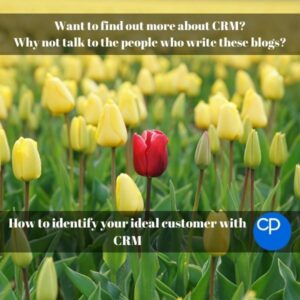 Here’s a question for you – when you think of your ideal customer, what image pops into your head?
Here’s a question for you – when you think of your ideal customer, what image pops into your head?
Does one specific customer come to mind? Several different types of customers? Or, perhaps, nothing at all? When you sit down for business planning sessions it can sometimes feel like this question relies too much on guesswork and not data. Well, this is the blog for you!
CRM can track everything that you need to identify your ideal customer. It could be that you define your best customer as clear cut as someone that pays on time, spends a lot of money with you or purchases from you all the time, but does that make them the ‘best’?
Can you tell your sales team to target prospects that they know will pay on time and spend a lot of money with you? How do you target that? Where do you spend your marketing budget to find those customers? I don’t know the answer to that question and if you do, please let me know!
Ideal Customer: Measurable Data
So, what makes a customer the ‘best’? To start, your ideal customer definition must include attributes that you can measure. We’re trying to turn something abstract into a science and all science starts with measurable data.
The definition of your ideal customer must include items that speak to your unique selling proposition (USP). There’s no point in specifying criteria that you cannot clearly demonstrate a feature or benefit for.
- Is your offering sector specific?
- Are you targeting a particular size of organisation?
- Is the seniority/position of your customer important?
- Who will be signing off on your deal? Finance? Marketing? Sales?
- How will your customer be using your service/product?
With CRM (assuming you have the data) you can easily run a search for Sales directors at manufacturing companies with 100 – 500 employees that cater to the renewables industry.
There you go, that is the ideal customer for my just made-up supplier to renewables manufacturers.
Ideal Customer: What do you do with this data?
You’ve run the search and been presented with a list of clients that fit those criteria, but what do you do next? Well, this data can be used to help guide any aspect of your business.
Marketing? Your marketing team now know where to target their campaigns, which events to send the sales team to, and what content they need to create and who that content will appeal to.
Sales? Your sales team now know they need to focus their efforts on closing deals with suppliers in the renewables industry, they can join renewables networking groups, and they know who to connect with on LinkedIn.
Directors? Your directors now know that they need to help their teams focus on these clients, they can network with current suppliers and see who they know, they can go and speak at events where all the renewables manufacturers attend and so much more.
Do you see where I’m going with this? Knowing the answer to the question – what is your ideal customer? – can guide every aspect of your business and thus help you grow and ultimately, become more profitable.
What about the customers that don’t make the cut?
So, what of those customers who don’t make it into the list of your best customers? Can CRM ensure that you don’t enter the “age of foolishness”? Don’t worry, I’m not about to suggest that you get rid of those customers, but, It’s often tempting to compromise on your ideal client criteria for the sake of a quick order. How you handle those customers is a key to the long-term success of your business.
If you change your ideal criteria to try and include every new business opportunity, then you risk overextending your marketing budget, if you’re trying for a one-size-fits-all approach to marketing, you’ll very quickly find your budget drained and incredibly low-quality leads. Your sales team could end up going to all manner of events only to find out the people there don’t want anything to do with you.
You’re better off targeting all your efforts to the customer type that you can delight the best.
If you have any questions or would like help with your CRM and interpreting its data, get in touch!




